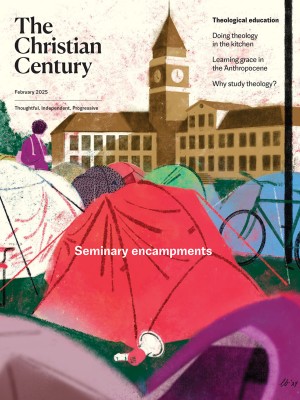
Image by Arkela / iStock / Getty
Our faith is really strange, isn’t it? When we sit down and actually talk it out, try to explain it to someone: This is who I think God is. This is what a life with God looks like. This is what I believe about Jesus, creation, heaven, hell, salvation. . . . Every now and again I find myself trying to explain my faith to someone outside Christianity—the Uber driver who got very curious when I said I was a theology professor, the agnostic student in my undergraduate theology class—and it’s an odd encounter, the kind where you start with the everyday words, scripts, and phrases that we use in our homes or with our Christian kin and then see the strained look on the other person’s face. Inside, I am asking, What am I even saying right now? It sounds like I believe in a secret society of magicians living in a world under the world we see everyday, or that somehow we are all living in a simulation. Those stories might even seem more believable.
As odd as those moments are, they’ve pressed me to take a step back from the language I once took for granted. “Who is God?” has become somewhat of a daily question for me, a kind of centering I’ve needed as God and Christianity and the Bible are invoked alongside policies of death and confinement and deportation and exclusion. We have similar words, but we seem to be speaking a different language, to have profoundly different ideas of what our world should be.
Read our latest issue or browse back issues.
I find myself in a kind of disequilibrium, given the strangeness of my faith in the face of those who do not share it and the differences between my hope and that of others who share Christian belief. In this confusion I come back to the question, “Who is God?”—answering it in an attempt to find a small handhold, something to keep me from slipping into a deep sleep in the face of the evil around us.
But instead of considerations of transcendence or difference or omnipotence, today I wonder if my descriptions of God aren’t so different from asking, “What is my breath?” or, “What is gravity?” In the nearness of these everyday miracles there is also depth, mystery that even the best words only begin to allude to. I say, “breath,” the biological process of drawing in air and my body breaking down unseen molecules into even smaller components for its use. But breath to me is not the process of molecular transformation. Breath is the stretch of my rib cage as I inhale deeply. Breath is gasping and panic when my asthma kicks in and my lungs suddenly feel like dough that sticks to my fingers as I search for air. Breath is watching my heart rate slow when I exhale until my belly reaches back to my spine, then inhale and let my lungs fill all the way to the bottom. Breath is the feeling of a smell coating the inside of my nose—stew bubbling on the stove or lavender blooming in the spring. Breath is to take in the world outside and welcome it.
Or maybe God is like gravity, the phenomenon of mass made real when I’m rubbing my head after I’ve tumbled down the stairs thinking I had one more step to go. Or the feeling in my lower back after an hour of walking with my three-month-old in the carrier. I might not be able to give you a scientific explanation of gravity, but I feel it in my everyday life.
This is God to me today, breath and gravity, the rising and falling of my chest, panic when I feel myself without her, the inevitability of my feet coming back to the ground every time I jump. Tomorrow I may describe her differently, but today this description helps me to see the miraculous moving through my body, the transcendent stitched into my everyday, an unrelenting presence that gives me the courage to keep speaking, keep making space because I know I will always come back to the ground.
I sit quietly and attend to my breath, to the rise and fall of my chest, let the quiet fall upon me so that I feel my heartbeat tamp its rhythm on my breastbone. I sit in wonder at this machine that is me and not me. I feel the gap between me and my body, and I feel the nearness, the body that is me, knitted and running through every beat, every breath, every step. And I begin to understand what I mean when I say “God,” the one who is with me and who is not me, the one who we live within, who is with us even as she is not us.
I doubt this explanation will go over any better with those who ask me about my faith. (It may even seem strange to those who share that faith.) But today, thinking about God as more like breath and gravity helps me to see the possibility of miracles, of shalom, as something that lives in me and in those I meet each day. It reminds me that I do not have to live a perfect way or create a perfect world, but I do need to listen to the movement my body wants to make to live. A life with God is not a perfect pronouncement of God’s personhood or the Ten Commandments on the wall. God is more like your breath than a judge.
In a world that feels increasingly frightening and overwhelming, maybe that’s where we start, feeling the breath come and go in our bodies, pressing our feet to the floor—and then asking how God breathes into the world through us. Does the movement of our life create spaces where we can all be free?






